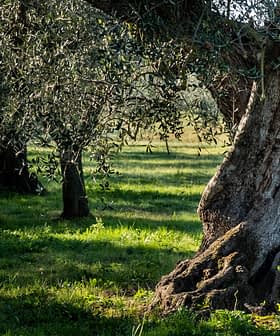Tunisia Second Among Africa's Organic Exporters
Despite the economic difficulties, some organic farmers have developed successful initiatives to rank Tunisia as the second largest exporter of organic products in Africa.
 Date harvesting in Tunisia
Date harvesting in TunisiaThe Tunisian Center for the Promotion of Exports (CEPEX), and the Directorate General for Organic Agriculture, have just announced that Tunisia has made major advances in organic agriculture to the point that it has become the second largest organic exporter in Africa, including olive oil, to 30 countries on five continents.
According to Aziza Htira, CEPEX CEO, Tunisia currently has 2,987 organic farmers, 66 percent of whom are exporters, which not only provides the Tunisian population with products that are good for health and respectful of the environment but does also create jobs.
See Also:Organic Olive Oil Production
For Aziza Htira, the development of organic farming “is a commercial asset that must promote the valorization of local know-how and the improvement of the living conditions of the populations of these often marginal areas, thus contributing to the conservation objective of Natural resources and cultural heritage with a sustainable development approach.”
Among the leading organic products exported by Tunisia are Tunisian Maltese orange, Harissa, Bsissa, Deglet Ennour dates, aromatic and medicinal plants, several wines and spirits, and olive oil. Exports of organic olive oil have thus achieved the best incomes with revenues of US$ 126 million out of the US$ 150 million in Tunisian exports of organic products in 2015.
Samia Maamer, managing director of organic agriculture at the Ministry of Agriculture, Water Resources and Fisheries, pointed out that this sector is very promising. “We are the only country in the Arab world to have put in place a technical regulation on the soil to exploit, but we will have to think about a new strategy, a new model of organic agriculture with all its achievements,“she said.
For those who may doubt about the organic quality of products imported from countries based outside the European Union, these organic products must also comply with organic European regulations.
It should be noted that Tunisia is the only African and Arab country to benefit from the recognition of equivalence with the European Union for the export of organic products since 2009. This recognition was renewed in June 2015 for an indefinite period.
So despite the economic difficulties Tunisia is going through, some entrepreneurs have developed some successful innovations and initiatives.
Domaine Fendri’s successful approach
Organic extra-virgin olive oil produced by the mills of Domaine Fendri, located in Meknassy (in the region of Sidi Bouzid), has won the multiple awards.
Slim Fendri, 49, heir to family know-how, has been working in the farm since 1995. With the democratization of organic food, he has chosen to focus on quality rather than quantity in order to enhance the organoleptic properties of his oils. And it was worth it. In 2011, he won his first international award and he has been collecting awards since then.
Today, the estate produces 150 to 200 tons per year of green gold, of which more than 100 tons are used for export. The olive grower, who demonstrated with careful work that the Chemlali variety, considered as common, could give a crop of excellence, plans to increase its production capacity by planting 10,000 additional olive trees, while preserving the human dimension of his business.








